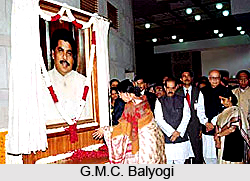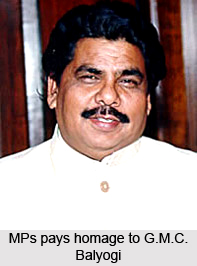 Shri Ganti Mohana Chandra Balayogi had the eminence of having been designated as the Speaker of the Twelfth Lok Sabha and returned with support from all the quarters as the Speaker of the Thirteenth Lok Sabha. As the Speaker of the House, he extensively contributed in preserving the prestige and dignity of the high office he held. He contributed also in strengthening parliamentary institutions in the country.
Shri Ganti Mohana Chandra Balayogi had the eminence of having been designated as the Speaker of the Twelfth Lok Sabha and returned with support from all the quarters as the Speaker of the Thirteenth Lok Sabha. As the Speaker of the House, he extensively contributed in preserving the prestige and dignity of the high office he held. He contributed also in strengthening parliamentary institutions in the country.
Indelible personality Balayogi was born on 1 October 1951 to Shri Ganniyya and Smt. Satyamma. They belonged to an agricultural family in the small village, right on the banks of the mighty and majestic Godavari River, of Yedurulanka, in the Konaseema region of East Godavari district, Andhra Pradesh. With a sister above and a brother below, he was second among three children. He was at the height of his fame when the cruel hands of death spur-of-the-moment him away on 3 March 2002. In his death, the country lost a young and dynamic parliamentarian. He left behind his wife Smt. Vijaya Kumari Ganti, one son and three daughters.
As he was grown up in a small village, Balayogi had to travel to Guttenadeevi village for his primary education. He received his Post Graduate degree in the city Kakinada and a law degree from Andhra University, Visakhapatnam. In the year 1980, Balayogi started his legal career at the Bar in Kakinada under the guidance of Shri Gopalaswamy Shetty. He was chosen as a First Class Magistrate in 1985. To start again his legal practice, he resigned from the Service and returned to the Bar in Kakinada.
In the intervening time, Andhra Pradesh came under the influence of the "NTR wave" in 1982 when N.T. Rama Rao, entered politics and formed the Telugu Desam Party. At that time, like many other young and educated Andhraites, Balayogi too registered himself as an activist of the newly formed party. Political acknowledgment and accountability came to him early enough when he took over the post Vice-Chairman of the Cooperative Town Bank of Kakinada in 1986. As the Chairman of the East Godavari Zilla Praja Parishad he was elected in 1987. He held that position till 1991 when for a higher position political fortune pushed him that very same year.
 Balayogi`s political career began in 1991 when under the Telugu Desam Party; he was selected to the Tenth Lok Sabha Lower House Parliament. In the General Election of 1996, he lost his seat. But destiny has thought of something else for him as he was soon selected to the Andhra Pradesh Legislative Assembly in a by-election from the Mummidivaram Assembly constituency. He was appointed as the Minister, consequently, of Higher Education in the Government of Andhra Pradesh. His sincere effort to make more efficient and strong educational system as minister was noteworthy in the sense that the role of education in the context of employment must be definite and careful.
Balayogi`s political career began in 1991 when under the Telugu Desam Party; he was selected to the Tenth Lok Sabha Lower House Parliament. In the General Election of 1996, he lost his seat. But destiny has thought of something else for him as he was soon selected to the Andhra Pradesh Legislative Assembly in a by-election from the Mummidivaram Assembly constituency. He was appointed as the Minister, consequently, of Higher Education in the Government of Andhra Pradesh. His sincere effort to make more efficient and strong educational system as minister was noteworthy in the sense that the role of education in the context of employment must be definite and careful.
Again in the year 1998, Balayogi contested from the same constituency, Amalapuram as the TDP candidate in the General Election. Destiny determined him to hold a higher position in national politics. With the support of the ruling coalition, on March 24, 1998, he became the 12th Speaker to the august office of Lok Sabha. That was one of the significant juncture of Indian`s Politics. The constitution of the House was somewhat complex in that no party had a clear majority while nearly forty parties had representatives in the House. The youngest, Speaker Balayogi, till date to occupy the office, found himself in a very demanding situation as temperament of the House, with the ruling alliance and the Opposition almost two-handed in terms of numerical strength. According to him it was a socio-political transformation. It was also observed by him that the august House, over the years also changing its nature. To Balayogi `the Legislature is an effective vehicle of social change and members have a stellar role to perform in pioneering the process of change and guiding the destiny of the nation`.
The appointment of Balayogi as Speaker was, undeniably, an example setting event. He was the first Dalit leader to be elected to the Chair in the history of free India. A member belonging to a regional party for the first time had become the Speaker of Lok Sabha. Thirdly, for the first time, a person born in Republican India had controlled over the Lok Sabha and thus him became the youngest Speaker of the largest democracy in the world.
On 22 October 1999, Balayogi was unanimously re-elected as the Speaker of the 13th Lok Sabha. A wide variety of socio-political shades, were being displayed by the enclosure of a large number of regional parties, had obviously made it quite an awesome body to preside over. Balayogi as the Speaker had observed his first and foremost duty would be to endorse and preserve the dignity and honor of the House. He gave the assurance to all the sections of the House as the Presiding Officer, he would be guided by the concept of combined wisdom and his actions would be non-partisan. Balayogi left an indelible impress of his personality in a short span, on the office of the Speaker of the Lok Sabha and was admired and acceptable to political parties of all shades.
He chaired as the Speaker, the Business Advisory Committee, Rules Committee, General Purposes Committee and Standing Committee of the Conference of Presiding Officers of Legislative Bodies in India, and over the Indian Parliamentary Group, National Group of Inter-Parliamentary Union and India Branch of the Commonwealth Parliamentary Association he presided. Balayogi headed many Indian Parliamentary Delegations along with these duties, to foreign countries, while hosting visiting countries as well.
Ganti Mohana Chandra Balayogi, on March 3, 2002, died in a helicopter crash in Kaikalur, West Godavari District, Andhra Pradesh. In his memory, G.M.C. Balayogi Athletic Stadium was named.




















